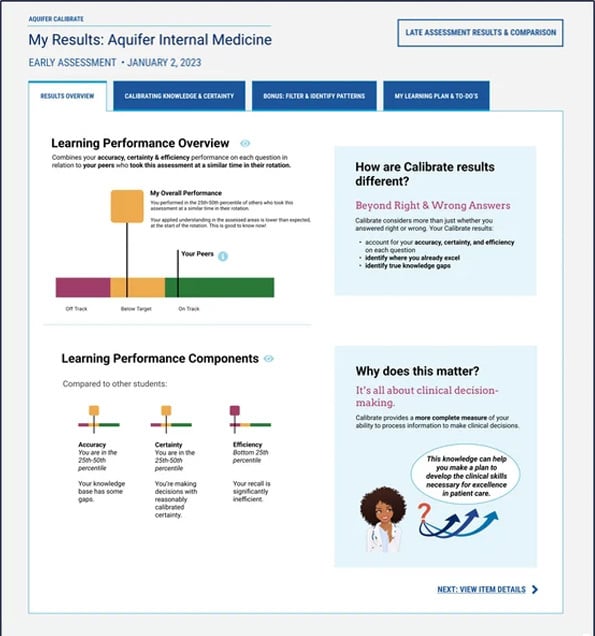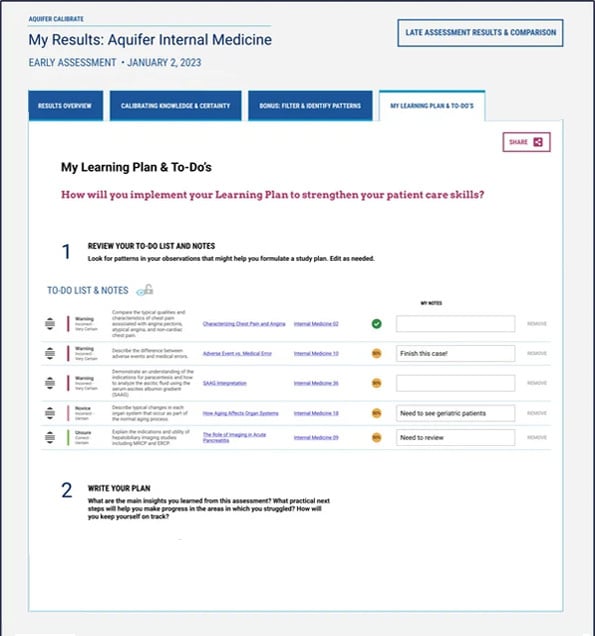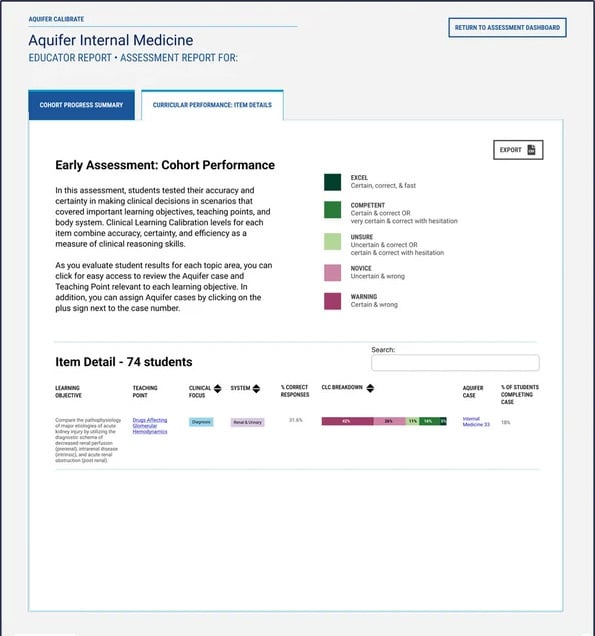Learning over Scoring
Aquifer Calibrate assessments are assessments for learning, leveraging the concepts of test-enhanced learning and spaced repetition. Calibrate drives self-directed learning in clinical students, helping them build higher order thinking and problem solving skills. Further, it provides a common tool and objective data to align students and faculty, and leverage mid-clerkship feedback.
With Calibrate, students can make the most of their clinical experiences–identifying areas of strength and weakness, and exposing blind spots where confidence and accuracy are misaligned. For faculty and administrators, Calibrate provides a structured way to support accreditation standards for feedback and self-directed learning, and includes valuable insights and data to drive effective coaching conversations, pinpoint learners in need of remediation, and identify curricular gaps.
Calibrate assessments are:
- Single-answer multiple-choice exams with a certainty rating for each question
- 25-45 questions long
- Designed to be given twice during a clerkship or course to leverage spaced learning
- Comprehensive to all cases in each Aquifer course
- Mapped to learning objectives and teaching points in Aquifer cases, which cover the national curriculum for STFM, AGS, AAR, COMSEP, and CDIM.
- Developed, written, and peer-reviewed by teams of trained medical educators
- Flexible to meet your needs and easy to administer
How Calibrate Helps
Calibrate reports deliver instant, actionable results to students, and provide a unique look at cohort and student summary performance for faculty. The newest reporting options also include detailed student reports to support coaching and remediation.
Calibrate is available at no additional cost with all institutional Curricular Partner subscriptions, or by course for one or more course subscriptions. If you are an Aquifer subscriber and would like to use Calibrate with your learners, contact the Aquifer Program Service Administrator at your program to request to be designated as a Lead Course Administrator so you can assign assessments.
-
Identifies True Knowledge Gaps
Calibrates Knowledge & Certainty
- Presents detailed reports that go beyond right or wrong answers
- Identifies areas of strength to expand upon during clinical experiences
- Provides new dimensions for diagnosing and addressing problem areas
- Underconfidence
- Overconfidence
- Knowledge gaps
-
Drives efficient self-directed learning
- Provides opportunities for reflection and learning with instant feedback
- Informs efficient study plans with easy addition of cases to student to-dos
- Links to relevant, trusted content to address gaps
- Supports accreditation standards on self-directed learning
-
Informs meaningful feedback & coaching conversations
- Aligns students and faculty around a common tool
- Provides objective data to drive conversations
- Supports accreditation standards for formative assessment and feedback
- Develops faculty coaching skills
-
Aligns to national curriculum
- Ensures that your students are learning core curricular objectives
- Highlights areas of curricular strength and areas for improvements
- Supports accreditation standards for curricular content and management
-
Easy to adopt
Trusted Tools, Quality Content
- Embeds within the overall Aquifer learning system
- Features simple administration
- Eliminates proctoring requirements
- Delivers highest quality assessments developed by your trusted peers and expert educators
Take a Look Inside
Calibrate reports deliver instant, actionable results to students, and provide a unique look at cohort and student summary performance for faculty. The newest reporting options also include detailed student reports to support coaching and remediation.
 The 25-40 board-style vignette questions in each Calibrate assessment are comprehensive to all cases in the Aquifer course, and mapped to the learning objectives and teaching points.
The 25-40 board-style vignette questions in each Calibrate assessment are comprehensive to all cases in the Aquifer course, and mapped to the learning objectives and teaching points.
-
Each question includes a certainty rating
-
Two separate exams are available per course, each with different questions
-
All questions were developed by expert educators
 Using Calibrate both early and late in a course is ideal, as it provides data about students’ learning at critical, formative touchpoints. If your rotation doesn’t fit with this best practice of assigning Calibrate twice, consider using the early version as a pre-test or mid-rotation checkpoint, or the late version as prep for a final exam.
Using Calibrate both early and late in a course is ideal, as it provides data about students’ learning at critical, formative touchpoints. If your rotation doesn’t fit with this best practice of assigning Calibrate twice, consider using the early version as a pre-test or mid-rotation checkpoint, or the late version as prep for a final exam.
- Educators set a window for students to take the exam on their own.
- Students complete the assessment on their own time, without needing a proctor.
- Students receive immediate feedback during the exam and results as soon as they finish.

Student Performance Reports
THOROUGH ANALYSIS & DEEP INSIGHTS
Student reports provide detailed information to illuminate knowledge gaps and drive efficient study planning. Reports include:
- Summary of performance & comparison between early & late assessments
- Detailed performance by learning objective/teaching point, including accuracy and certainty ratings
- Easy next steps with linked teaching points and related cases for full clinical context
- Sort options within the report to easily view areas that were not accurate or lacked certainty

MAXIMIZE YOUR STUDY TIME
Students have the ability to directly add Aquifer cases from their Calibrate reports (and now within their exam feedback) to a to-do list. From there, they can build a learning plan to share with a coach or preceptor. Features include:
- Easy ability to add cases with notes to a to-do list
- Prompts to reflect on results to find key insights, determine next steps, and create an accountability plan
- Share directly with your coach

HIGHLIGHTING CURRICULAR GAPS
Compare cohort performance across early and late administrations of the assessment, and find curricular gaps easily by seeing cohort performance by system and clinical focus–and at a granualar level by teaching point and learning objective. See at a glance exactly where your students are succeeding and where they need additional help. You can even compare results across cohorts to get a big-picture view of your curriculum.
IDENTIFY AT-RISK STUDENTS
High-level student performance summaries support early identification of students in need of coaching or remediation. Results are color-coded and easy to sort, with access to notes to drive coaching conversations. Zoom in on detailed student results to inform coaching conversations and support students in identifying trends and next steps.
TRACK PROGRESS ACROSS ASSESSMENTS
Easily view student progress across multiple assessments and disciplines–and jump into individual student results if more detail is needed.
Learn More with These Podcasts
Podcast: Coaching Conversations – Tips & Tools to Empower Learners
Guest: Sherilyn Smith, MD, Professor Emerita of Pediatrics, University of Washington School of Medicine and International Coaching Federation Certified Coach
Dr. Sherilyn Smith provides tips on how to prepare for and conduct coaching conversations that develop students into lifelong learners who are able to create plans, take time to reflect, identify personal learning gaps, and who are motivated to fill those gaps. Dr. Smith also discusses how Aquifer’s new Calibrate formative assessment system benefits faculty and students by providing information that can inform and enhance their coaching conversations. Full show notes can be found here.

Podcast: Implementing Coaching in Clinical Settings
Guest: Sherilyn Smith, MD, Professor Emerita of Pediatrics, University of Washington School of Medicine and International Coaching Federation Certified Coach
Dr. Sherilyn Smith returns to our podcast to discuss how to implement coaching in clinical settings. We revisit our discussion about the value of coaching to develop master adaptive learners and then spend time focusing on the specifics of preparing for and conducting coaching conversations with learners–with advice on how to use Aquifer Calibrate, our formative assessment system.
Full show notes and additional resources, including Aquifer’s coaching and feedback template, can be found here.



